|
Wednesday,
7 June:
Delegates
to the informal meetings preceding SB-12 met to discuss: Protocol
Article 3.14 (adverse effects); technology transfer; compliance;
guidelines under Protocol Articles 5 (methodological issues), 7
(communication of information) and 8 (review of information); and
capacity building. They also convened for a briefing on the IPCC
Special Report on Land Use, Land-Use Change and Forestry (LULUCF).
|
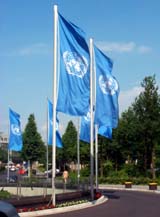 |
Informal meeting on
development and transfer of technology |
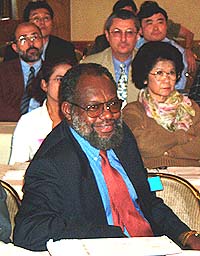
| Ogunlade Davidson, IPCC, outlined
the IPCC Special Report on Methodological and Technological
Issues in Technology Transfer. He stressed that technology
transfer for climate change should always be viewed in the
FCCC's context, and underscored the need for rapid technology
innovation and broad transfer of EST for mitigation and adaptation.
The IPCC's special report can be downloaded at http://www.ipcc.ch/
|
|
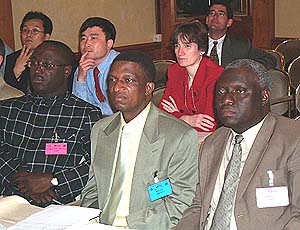
| Reporting on the African workshop,
Peter Zhou (Botswana) [center] outlined
technology transfer barriers including the lack of climate
change policies, weak legal and regulatory frameworks, inadequate
finance and problems with structural adjustment programmes.
He noted the need to, inter alia: create strategic partnerships
between governments, the private sector, and donors; provide
easier access to financing environmentally-sound technologies
(ESTs) and local technologies; and enhance skills to support
decision making. |
|
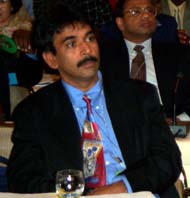
| Mahendra Kumar (Samoa), reporting
on the Asia-Pacific workshop, said technology needs assessments
should be country-driven and transparent, involving multi-stakeholder
participation. He noted the limited attention paid to adaptation
technologies. |
|
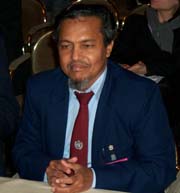
| Sheik Mohamed Khan (Guyana)
said the Latin America and Caribbean workshop stressed the
need to, inter alia: build indigenous capacities to assimilate
and absorb climate-friendly technologies; improve access to
technology information; involve smaller countries in capacity
building initiatives; and overcome political barriers that
result in low prioritization of technology issues. |
|
Informal meeting on
compliance |
Delegates considered the Co-Chairs'
Elements of a Compliance System for the Kyoto Protocol.
|
Co-chairs T. N. Slade (Samoa)
[left] and Dovland [right]
|
|
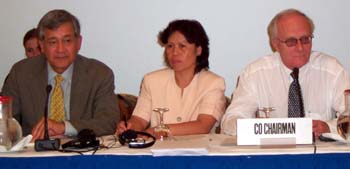 |
|
Briefing on the
IPCC Special Report on LULUCF
|
IPCC Chair Robert Watson presented
the major findings of the IPCC Special Report on Land Use, Land-Use
Change and Forestry (LULUCF), which were then elaborated upon
by the lead authors.
The IPCC's special report can
be downloaded at http://www.ipcc.ch/
|
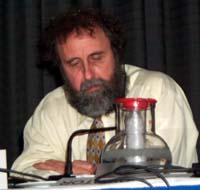
 Setting the stage for the presentation of the IPCC special
report on Land-Use, Land-Use Change and Forestry, IPCC Chair
Dr. Robert Watson asserts that in the interests of
a strong compliance regime, it will be critical to establish
proper accounting systems, with accurate and standardized
definitions.
Setting the stage for the presentation of the IPCC special
report on Land-Use, Land-Use Change and Forestry, IPCC Chair
Dr. Robert Watson asserts that in the interests of
a strong compliance regime, it will be critical to establish
proper accounting systems, with accurate and standardized
definitions. |
|
|
 Dr. Robert Watson discussed the details and complications
surrounding the need to establish viable and consistent
definitions, accounting, and methods. Current definitions
employed were not specifically designed for Kyoto purposes
and may not be of use in climate change policy. In
fact, the application of these definitions and methods may
compromise the strength of the compliance system. Examples
include the need to distinguish terms such as deforestation,
afforestation, reforestation, harvesting, regeneration,
etc., and the need to establish gauges and thresholds for
measuring these definitions.
Dr. Robert Watson discussed the details and complications
surrounding the need to establish viable and consistent
definitions, accounting, and methods. Current definitions
employed were not specifically designed for Kyoto purposes
and may not be of use in climate change policy. In
fact, the application of these definitions and methods may
compromise the strength of the compliance system. Examples
include the need to distinguish terms such as deforestation,
afforestation, reforestation, harvesting, regeneration,
etc., and the need to establish gauges and thresholds for
measuring these definitions.
|
|
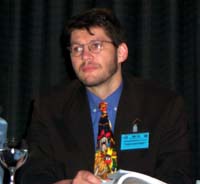
 Dr. Bernard Schlamadinger discussed Article 3.3 of
the Kyoto Protocol, presenting 3 case-studies of different
carbon accounting systems applied to the FAO definitional
scenario, and illustrating the variance in results of these
accounting systems.
Dr. Bernard Schlamadinger discussed Article 3.3 of
the Kyoto Protocol, presenting 3 case-studies of different
carbon accounting systems applied to the FAO definitional
scenario, and illustrating the variance in results of these
accounting systems. |
|
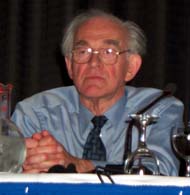
 Dr. Bert Bolin emphasizes that anthropomorphic activities
have upset the balance in the global carbon cycle, most noticeably
in the last 150 years. He estimates that emissions from
land-use and land-use change have contributed some 20% to
global carbon emissions resulting from human activities.
Dr. Bert Bolin emphasizes that anthropomorphic activities
have upset the balance in the global carbon cycle, most noticeably
in the last 150 years. He estimates that emissions from
land-use and land-use change have contributed some 20% to
global carbon emissions resulting from human activities.
|
|
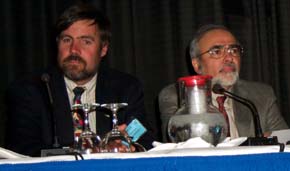
|
Dr. Robert Scholes
[above
left] spoke on
Article 3.4, noting the magnitude of additional activities
could be substantial compared to Article 3. obligations.
Scholes distinguished between changes in management and
land cover, highlighted verifiability, and associated non-climate
impacts and benefits as key issues for the COP.
Dr. Jayant Sathaye
[right]
noted that LULUCF project experience
is being gained through AIJ activities, and discussed concerns
with projects, their permanence, baselines, additionality,
carbon leakage, monitoring and verification and implementation
of sustainability conditions.
|
|
|
Interview with Jacob
Werksman
|
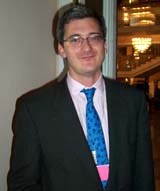 Jacob
Werksman (Samoa) comments on the importance of this week's
informal meetings on compliance, citing the high political-economic
stakes involved in flexibility mechanisms. For AOSIS countries,
two key issues in compliance are (i) the ability of the regime
to, from the outset, review and assess Parties' preparedness to
engage in emissions trading (involving proper accounting systems),
and (ii) the ability of this regime to evaluate compliance and
impose meaningful consequences. Jacob
Werksman (Samoa) comments on the importance of this week's
informal meetings on compliance, citing the high political-economic
stakes involved in flexibility mechanisms. For AOSIS countries,
two key issues in compliance are (i) the ability of the regime
to, from the outset, review and assess Parties' preparedness to
engage in emissions trading (involving proper accounting systems),
and (ii) the ability of this regime to evaluate compliance and
impose meaningful consequences.
 RealAudio of the interview
RealAudio of the interview
|